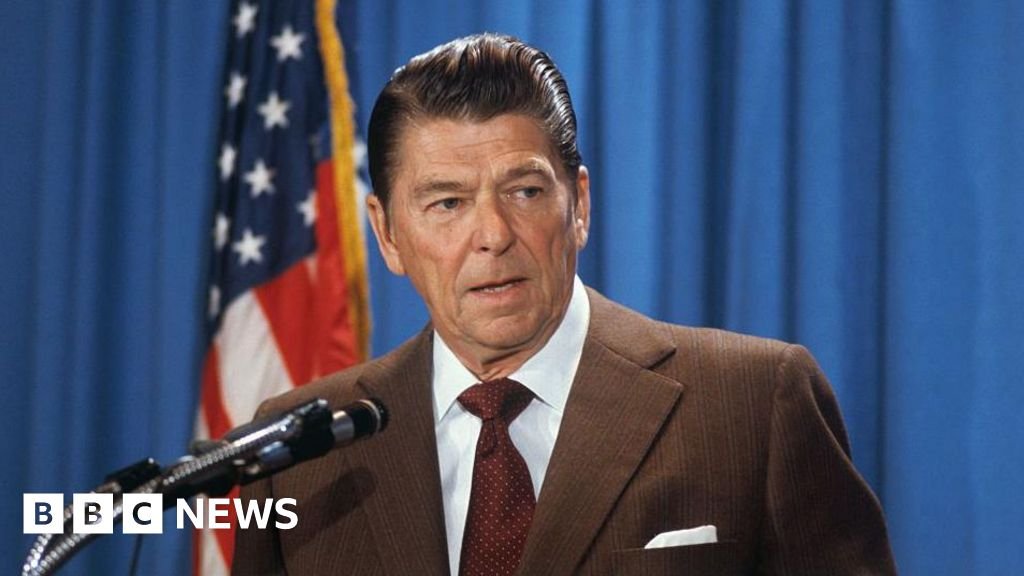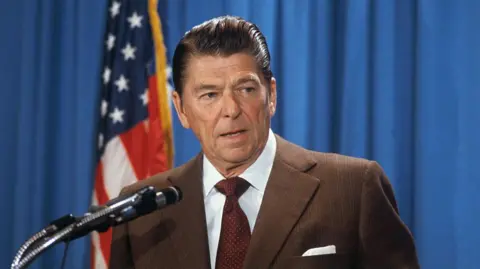
What was it about Reagan’s ad that caused the US-Canada trade talks to collapse?

 Getty Images
Getty ImagesUS President Donald Trump has said he will immediately end all trade negotiations with Canada following an ad in which his predecessor Ronald Reagan said the tariffs “hurt every American”.
The ad, sponsored by the Canadian province of Ontario and released last week, features excerpts from Reagan’s 1987 address that focused on foreign trade.
Trump called the ad ‘fake’. The Ronald Reagan Foundation said it “misrepresented” the former president’s speech.
The minute-long ad contains only excerpts from the original, five-minute address, not altering Reagan’s words. However, he varies the order in which he makes the comments.
The lines are given below Advertising In italics, followed by an explanation of how they appear in the original (indicated in bold). address.
“When someone says, ‘Tariffs on foreign imports,’ it looks like they’re doing the patriotic thing by protecting American products and jobs. And sometimes, for a little while, but only for a little while.”
This is the opening line of a minute-long ad. The words have not changed.
But Reagan doesn’t speak these lines until halfway through his original address.
In a 1987 radio speech – Address to the Nation on Free and Fair Trade – Reagan said the Japanese prime minister would visit the White House and discuss “recent disagreements” on trade. Reagan had recently imposed tariffs on some Japanese goods over a trade agreement dispute.
By the time he reaches the opening line of the ad, he has expressed his disdain for tariffs, describing the “prosperity and economic growth that only free trade can bring” and saying that the Great Depression was worsened by high tariff legislation.
“In the long run, such trade barriers hurt every American, worker and consumer.”
In advertising, these words immediately follow the first line. Again, Reagan spoke the words.
However, the original address does not add two sentences. In fact they are separated by more than a minute of speech and the line “over the long run..” actually comes first.
After introducing the Japanese state visit, Reagan began to explain why he had recently implemented the tariffs.
He says in the original speech: “I am loathe to take steps to impose such tariffs or barriers to trade and restrictions of any kind. And in a moment I will state the concrete economic reasons for this: That in the long run such trade barriers hurt every American worker and consumer.“
Regan says some companies are “engaging in unfair trade practices” and going against the deal with the US – and that’s why this is a “special case”.
This sets the tone for the rest of the address, which he devotes to explaining his commitment to free trade and the dangers of high tariffs.
“Higher tariffs inevitably lead to retaliation from foreign countries and vicious trade wars.”
This is the third line of the ad and again these are Reagan’s words. But again, in the original speech they don’t directly follow the previous line in the ad. There is about a minute to separate them in the address.
In a 1987 speech, he said this line in the middle of his address, describing what he saw as the consequences of the tariffs. He says:
“What ends up happening is: First, indigenous industries begin to rely on government protection in the form of high tariffs. They stop competing and making the innovative management and technological changes needed to succeed in the world market. And then, while all this is going on, something bad happens. Higher tariffs inevitably lead to retaliation from foreign countries and a vicious trade war.”
“Then the worst happens. Markets collapse and collapse, businesses and industries close, and millions lose their jobs.”
Reagan says this line after the previous one – but the ad cuts to the few sentences that separate them.
Here’s the full run from one to the other in the original:
“Higher tariffs inevitably lead to retaliation from foreign countries and vicious trade wars. The result is higher and higher tariffs, higher and higher trade barriers, and less and less competition.
“So, soon, with prices artificially high through tariffs that subsidize inefficiency and poor management, people stop buying. Then the worst happens: markets collapse and crash; closure of businesses and industries; And millions lose their jobs.”
“Throughout the world, the path to prosperity for all nations is increasingly to reject protectionist laws and encourage fair and free competition.”
Here, the ad goes back about a minute – but the words are the same.
In the original, Reagan extols the economic benefits of free trade and adds: “Now, that’s the message of free trade that I gave to Canadian leaders a few weeks ago, and it was very well received there. Indeed, There is a growing realization throughout the world that the way to prosperity for all nations is to reject protectionist laws and promote fair and free competition.”
He speaks of “sound historical reasons” for this realization: “For those of us who lived through the Great Depression, the memory of the suffering it caused is deep and terrible.”
He says experts believe that the high tariff laws passed at the time “greatly increased depression and stunted economic recovery”.
“America’s Jobs and Growth Are at Risk.”
Thus Reagan ends his speech in both a speech and an ad regarding tariffs.
The final part of his speech is omitted from the ad — in which he says he is “determined to save the American people from protectionist legislation that destroys prosperity” and criticizes opponents in Congress who “want to make quick political gains” and “forget” the millions of jobs involved in trade.












Post Comment